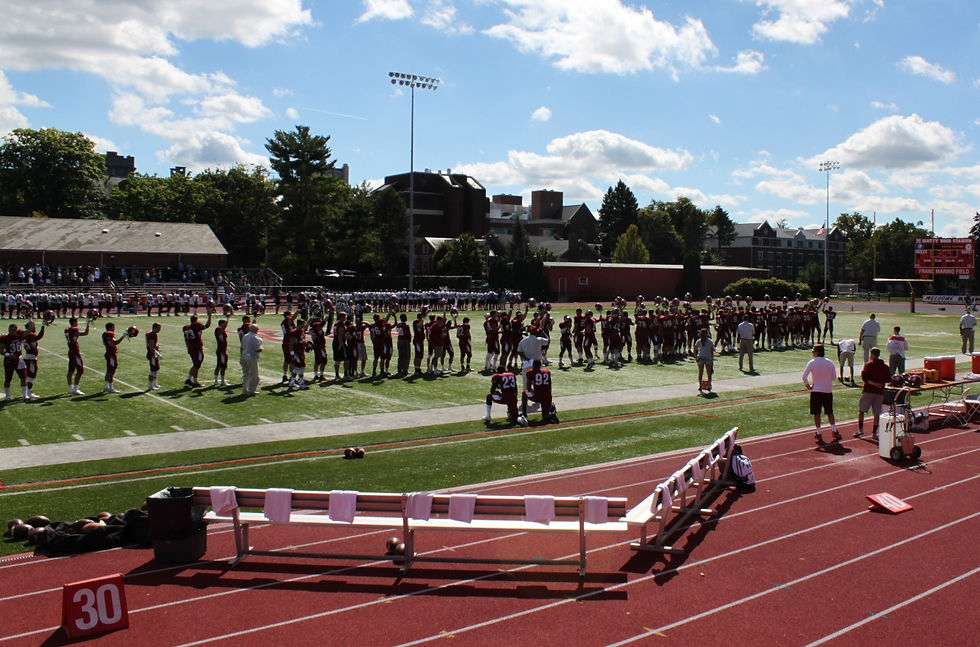Spotlight: Blair and Carter kneel in protest
- Alyssa Hertel
- Oct 21, 2016
- 3 min read

On Aug. 26, during a preseason game between the San Francisco 49ers and the Green Bay Packers, Colin Kaepernick became both the most famous and most hated player in the National Football League. He didn’t cause injury to another player or throw an absurd amount of interceptions. But what he did, in the eyes of many Americans, was much worse.
Colin Kaepernick sat for the national anthem.
He had actually done the same thing unnoticed for the first two preseason games, but only gained this mix of fame and hatred after people on Twitter analyzed a picture taken during the anthem. Shortly after, Kaepernick changed to kneeling during the anthem and he was joined by 49ers safety Eric Reid. His protest—an act of solidarity for the people of color impacted by oppression and the ongoing issues with police brutality— has snowballed ever since.
These protests of the national anthem have spread across teams, sports, genders and into college athletics. A man that once sat alone partially hidden by water coolers and medical equipment is now supported by thousands, if not millions, of allies fed up with the same oppression and police brutality. Two of those supporters play on Muhlenberg’s football team.
Amir Blair ‘18 didn’t have to wait a game or two to know that he wanted to follow in Kaepernick’s footsteps. His protests began at Muhlenberg’s first game of the season, during an away game against Wilkes University. He continued to sit alone on the bench when the team returned to Scotty Wood Stadium, silently sharing a brief moment of solidarity with those doing the same. Blair transitioned to kneeling during the anthem. It was then that he was joined by teammate Amir Carter ‘19.
“I’ve always wanted to participate in the protest, but I didn’t realize I harbored the courage to do so until I noticed Amir sitting during the national anthem,” said Carter. “Seeing someone with the same views as myself made me feel even more comfortable to protest.”
Kaepernick may have opened the door for many athletes like Blair and Carter to express their beliefs, but that doesn’t mean that all these protests were accepted willingly. A large majority of those participating have received backlash from fans and fellow athletes alike. For Blair and Carter, it seems that their coaches and teammates have been understanding, and they’ve supported them by allowing their protests to continue throughout the season. One teammate, who according to Carter happens to be caucasian, did express his respect and understanding for what they were doing. But neither player seeking praise for their actions.
“I don’t kneel during the national anthem to gain attention or to elicit responses from people,” said Carter.
Instead, he hopes that their protests will spread awareness of the social injustice, and systematic and institutionalized racism in the United States. Carter hopes to spark conversations and get people talking about issues, like police brutality disproportionately targeting minorities.
One of the biggest critiques of Kaepernick’s protest focused on how disrespectful not standing for the anthem was. Some people see the anthem and the flag as a symbol for the military and think these protests are a sign of respect to them. That is not the intent, either in Kaepernick’s protest nor Blair and Carter’s.
“I mean no disrespect to our veterans, I completely respect and honor their bravery and duty to protect our country. The flag is a symbol of our country, which is supposed to represent liberty, freedom and equality. However, not everyone is treated equally. It is my right as an American citizen to freely express my beliefs, which in this case is to not take pride in a country that oppresses people of color.”
Blair and Carter will continue to kneel, at least through the end of the football season. Amir Blair has one more year at Muhlenberg; Amir Carter has two. There’s a good chance they will continue their protests next season—that is if protests are still needed. One would hope that, over the next few years, real change can be achieved. For Carter, there are various issues that need to be addressed and resolved before he’ll even consider not kneeling during the national anthem. A noticeable protest is not the endgame.
“While acknowledgement is a great step, it is not enough; we must strive for a measurable change. No one should have to grow up in a country where they are treated differently or simply viewed as not enough because of their skin color.”
Photo courtesy of Kaitlin Errickson.







Comments